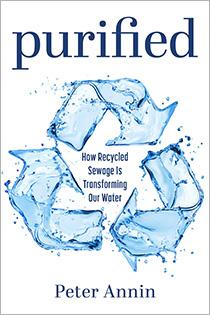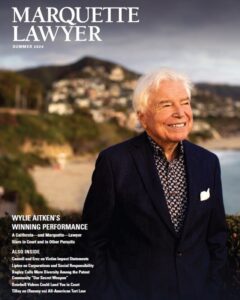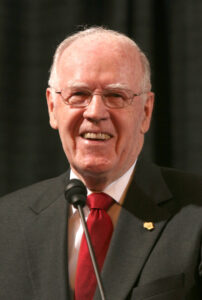Will Water Recycling Come to the Midwest?
Existing drinking water sources are under increasing strain due to overuse, climate change and other threats. Water recycling, also known as water reuse, may play a significant role in creating the sustainable cities of the future. Millions of people around the country are already being asked to drink recycled water, either indirectly (through a process in which treated wastewater is discharged to an environmental buffer such as groundwater or surface water and is later taken into the water distribution system) or even directly (when treated wastewater is immediately discharged into the water distribution system without an environmental buffer). At an April 10 conference sponsored by the Law School’s Water Law and Policy Initiative, several experts discussed the history and future of such technologies, and whether they are likely to emerge in Wisconsin or remain limited to the more arid parts of the county.
Noted author and journalist Peter Annin opened the event with a summary of his new book, Purified: How Recycled Sewage is Transforming Our Water. Annin described a significant water crisis facing many parts of the country, leading also to trouble in the production of food and energy, sectors long intertwined with water. Annin cited only two realistic options for “new” water supply—desalination and water reuse. Reuse is the far more sustainable option, he said.
Annin covered numerous historical case studies involving efforts communities have made to introduce recycled water into their water supply portfolios. Some were successful (Orange County), others less so (San Diego, at least at first). But Annin explained that careful examination of the United States Drought Monitor reveals that water shortages are not only a problem in the arid West. As a result, water reuse projects have been implemented or at least attempted in the more humid parts of the country too—in Norfolk, Virginia and Tampa, Florida, among other places.
In reviewing the lessons learned from all these efforts, Annin identified several keys to successful implementation of water recycling projects, including effective strategies for communicating with the public, rigorous monitoring of the water produced, and reliable technologies to ensure public safety.
In Wisconsin, at least so far, such technologies are more a matter of interest than necessity. “Nobody recycles water because it’s cool,” said Theera Ratarasarn, a panelist reacting to Annin’s presentation who is Chief of the Public Water Engineering Section for the Drinking Water and Groundwater Program at the Wisconsin Department of Natural Resources. Instead, they do it because they have no other choice; it is a last resort. In Wisconsin, Ratarasarn said, “everywhere you look, you find water.” Thus, he said, it isn’t necessary to resort to water recycling. In fact, it would run afoul of a Wisconsin legal requirement that the public drinking water supply come from “the best available source practicable.” As a result, Wisconsin regulators are more concerned about other pressing issues like PFAS, lead, and nitrate pollution.
Another panelist, Rachel Havrelock, who is Professor of English and director of The Freshwater Lab at the University of Illinois at Chicago, observed that most people are accustomed to “single-use water,” and this view drives our discomfort with water recycling. In fact, she said, water recycling more closely emulates nature and the multiple-use water cycle. In most places, she said, there is already de facto water reuse, with treated wastewater returned to surface water and soon thereafter reclaimed for drinking water treatment a short distance away. Havrelock’s team has proposed a separate water reuse-driven supply for agricultural and industrial purposes in Chicago and the surrounding areas. “We don’t need to drink recycled water here,” she said, but reuse can still make a big difference by reducing the load on the portion of the water supply that will be used for drinking. She cited a “groundwater emergency” in many parts of the Midwest. “Water reuse is part of climate change adaptation,” she concluded, and the “legal world is absolutely vital at this juncture” to regulate the practice.
Michael Duczynski, a research civil engineer with the United States Army Engineer Research and Development Center, confirmed that from the military perspective there are plenty of avenues for non-potable reuse. The military, he said, has large critical infrastructure needs at many of its installations around the world, including everything from cooling towers to data centers. The resilience of those installations—and of civilian communities— can be increased through water reuse options, he said. Duczynski described a new project through which the military is discerning the regulatory requirements for a spectrum of potential reuse applications spanning different levels of treatment, different end uses, and different jurisdictions. Employing some of these projects could save millions of gallons of water, he predicted.
Video of the full program is available here (click the “watch now” button).


 All his life, Wylie Aitken has loved the performing arts. He wanted to make it on the stage, in movies, or in concert halls. He also wanted to advocate for people who were not getting fair deals in some important ways. As a young man, he realized the best path for him was to focus on the latter while drawing on his talents for the former. In the 1960s, he took his dreams from Southern California to Marquette Law School, where he developed skills essential to success as a lawyer. Returning home, he then launched a long and successful career performing, as he puts it, for audiences of 12, namely, members of juries. Aitken has won cases against giants such as Disneyland and the auto industry on behalf of what he calls “the little guys.” And beyond his legal practice in Orange County, California, he and his wife, Bette, have been influential in building up the performing arts, supporting Democratic politicians, and boosting the quality and vitality of education institutions. That includes generosity they have shown for years to Marquette Law School and Marquette University.
All his life, Wylie Aitken has loved the performing arts. He wanted to make it on the stage, in movies, or in concert halls. He also wanted to advocate for people who were not getting fair deals in some important ways. As a young man, he realized the best path for him was to focus on the latter while drawing on his talents for the former. In the 1960s, he took his dreams from Southern California to Marquette Law School, where he developed skills essential to success as a lawyer. Returning home, he then launched a long and successful career performing, as he puts it, for audiences of 12, namely, members of juries. Aitken has won cases against giants such as Disneyland and the auto industry on behalf of what he calls “the little guys.” And beyond his legal practice in Orange County, California, he and his wife, Bette, have been influential in building up the performing arts, supporting Democratic politicians, and boosting the quality and vitality of education institutions. That includes generosity they have shown for years to Marquette Law School and Marquette University. A week and a half ago, the Law School held our annual Alumni Awards Reception and Conferral—always a highlight of our year. For it enables us to celebrate Marquette Law School’s spirit and ideals by recognizing four exemplars of the genus (or perhaps it’s the species) of the Marquette lawyer.
A week and a half ago, the Law School held our annual Alumni Awards Reception and Conferral—always a highlight of our year. For it enables us to celebrate Marquette Law School’s spirit and ideals by recognizing four exemplars of the genus (or perhaps it’s the species) of the Marquette lawyer.